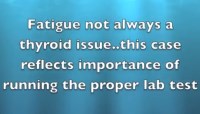 Adrenal Fatigue
Adrenal Fatigue

Here is a case I see quite often…A patient presents with a label or diagnosis that is limited to a lab value being off versus a comprehensive whole body view of what is really not functioning properly. This patient presents as a thyroid patient but the core of her fatigue symptom is an adrenal exhaustion and adrenal rhythm shift. A Functional, whole body approach to one’s health is key to recovery in chronic health conditions.
Interviewer: What were some of the problems you had when you first started with us?
Interviewee: The main thing I initially came in for was fatigue. For many years now, I’ve suffered with low energy, wasn’t sure what was going on. Also have a little bit of anxiety that comes along with that. But I was mainly focusing on the fatigue and just becoming a healthier person in general.
Interviewer: Yes, exactly. I was surprised when you came in to see the length of time you had the fatigue; even to the point you were drinking Mountain Dews on a regular basis.
Interviewee: Yes. [Laughter]
Interviewer: So one of the first things we did, we started addressing things that contribute to not sleeping good and why would you need a whole bunch of things to support energy levels during the day like that. So we did some dietary changes, but we also did some detoxification. In the meantime while we were doing the detoxification, we ran a lab on you, an adrenal stress index. Now that’s where we look at your cortisol level and read them. Do you remember what it was like, the results of that test?
Interviewee: Yeah My cortisol is elevated at night, which explained why I was king up several times a night which also explains some of the fatigue [Laughter] during the day
Interviewer: Yes, that’s it. And I really like running that adrenal stress test, because when you look at people’s cortisol level and rhythm, we found out that she has a dip about 4:00 in the afternoon, so she’s getting tired; and then it rises just as soon as it’s time to start
going to bed. And people that have high cortisol at night, they don’t sleep good. So we did some adrenal stress support, we worked on doing some nutritional detoxification and some support, and we’re working on the neuroendocrine system from a nutritional standpoint. And how do you think you’ve done?
Interviewee: Really well. You’re actually the first doctor that thought to check my adrenals, and so I’m very appreciative of that because that’s really uncovered a big part of what’s been going on with me. So thank you, Dr. Parker, for that.
Interviewer: You’re so welcome.
Interviewee: And I’ve seen a great improvement. I’m taking care of myself, I’m thinking not just about – you know, I’m taking supplements, but I’m also changing my diet, so I’ve seen that come into play. You’ve really been my accountability partner
for that. As a single person, you know, I don’t always have that person to kind of keep me in check what I’m doing at home as far as my eating habits and exercise habits. So besides just focusing on the inside, you’ve helped me kind of look at the whole picture, and I appreciate that.
Interviewer: You’re such a pleasure to take care of; and I want you to know, this is a classic case. You
actually came to me for a thyroid issue, when in fact, the biggest problem you were having was an adrenal malfunction. So we worked on those things and you did a really great job of making some lifestyle changes; and I appreciate you sharing that with me and sharing this video with us. Would this be okay if I use this to help share to other people?
Interviewee: Definitely. What I want people to know that are watching this Dr. Parker, he’s got the knowledge, but what he also has that not every doctor has is the personality to really empathize with his patients. And that’s what I really appreciate, because
you don’t always get both of those with a doctor. And you, by far, have exceeded my expectations with this; and I look forward to continuing being your patient and just keep working on everything to the point where there’s nothing to work on. [Laughter]
Interviewer: That’s so awesome and I really, really appreciate that, and I do enjoy taking care of patients; and thank you so much.
